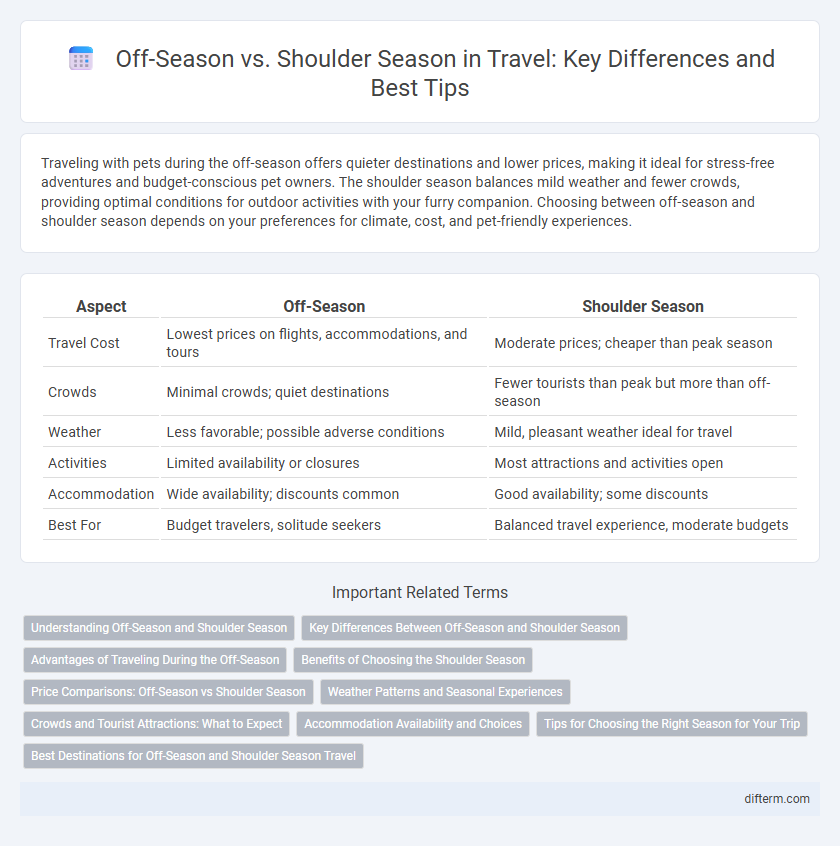Traveling with pets during the off-season offers quieter destinations and lower prices, making it ideal for stress-free adventures and budget-conscious pet owners. The shoulder season balances mild weather and fewer crowds, providing optimal conditions for outdoor activities with your furry companion. Choosing between off-season and shoulder season depends on your preferences for climate, cost, and pet-friendly experiences.
Table of Comparison
| Aspect | Off-Season | Shoulder Season |
|---|---|---|
| Travel Cost | Lowest prices on flights, accommodations, and tours | Moderate prices; cheaper than peak season |
| Crowds | Minimal crowds; quiet destinations | Fewer tourists than peak but more than off-season |
| Weather | Less favorable; possible adverse conditions | Mild, pleasant weather ideal for travel |
| Activities | Limited availability or closures | Most attractions and activities open |
| Accommodation | Wide availability; discounts common | Good availability; some discounts |
| Best For | Budget travelers, solitude seekers | Balanced travel experience, moderate budgets |
Understanding Off-Season and Shoulder Season
Off-season refers to the period when tourist destinations experience the lowest visitor numbers, typically resulting in reduced prices and fewer crowds. Shoulder season occurs just before or after the peak travel times, offering a balance of mild weather and moderate tourist activity. Traveling during these times can provide cost savings and a more relaxed experience while avoiding the extremes of high-season crowds or off-season closures.
Key Differences Between Off-Season and Shoulder Season
Off-season travel occurs during the lowest tourist demand periods, often characterized by reduced prices, fewer crowds, and limited services, while shoulder season represents the transitional phase between peak and off-peak times, offering moderate prices and balanced crowd levels. Off-season destinations may experience adverse weather or reduced accessibility, whereas shoulder season typically provides more favorable climate conditions and better availability of tourist amenities. Understanding these key differences helps travelers optimize budget, comfort, and overall experience depending on their priorities and destination.
Advantages of Traveling During the Off-Season
Traveling during the off-season offers significant advantages such as lower accommodation and flight prices, allowing for more budget-friendly trips. Tourist destinations are less crowded, providing a more authentic and relaxed experience at popular sites and local attractions. Off-season travel often includes favorable weather conditions and special local events, enhancing the overall cultural immersion.
Benefits of Choosing the Shoulder Season
Choosing the shoulder season for travel offers significant benefits such as fewer crowds, which enhances the overall experience at popular destinations. Travelers often find better deals on accommodations and flights compared to peak seasons, providing exceptional value without sacrificing favorable weather conditions. The shoulder season also allows access to local events and cultural activities that are less accessible during high-traffic periods, making it an ideal time for immersive travel experiences.
Price Comparisons: Off-Season vs Shoulder Season
Off-season travel typically offers the lowest prices on flights, accommodations, and attractions due to decreased demand, making it ideal for budget-conscious travelers. Shoulder season presents a balance with moderately reduced prices and better weather conditions than the off-season, often resulting in cost savings without the extremes of off-peak travel. Price comparisons reveal that while off-season rates can drop by up to 50%, shoulder season discounts usually range between 15-30%, combining affordability with a more comfortable experience.
Weather Patterns and Seasonal Experiences
Off-season travel often brings cooler temperatures and frequent rainfall, limiting outdoor activities but offering quieter attractions and lower prices. Shoulder season experiences moderate weather with mild temperatures and fewer crowds, providing ideal conditions for sightseeing and local events. Weather patterns during these periods directly impact seasonal experiences, influencing travelers' choice between solitude in off-peak months and pleasant climates in transitional seasons.
Crowds and Tourist Attractions: What to Expect
During the off-season, tourist attractions experience fewer crowds, allowing for a more relaxed and intimate exploration of popular sites. In contrast, the shoulder season offers moderate visitor numbers, balancing accessibility with a livelier atmosphere. Travelers can enjoy shorter wait times and better opportunities for personalized experiences during both periods compared to peak travel seasons.
Accommodation Availability and Choices
Off-season travel offers greater accommodation availability, often featuring lower rates and less crowded options due to reduced demand. Shoulder season provides a balanced choice with moderate prices and more variety, as it bridges peak and off-peak periods. Both seasons can deliver unique opportunities for travelers seeking flexibility and value in lodging selections.
Tips for Choosing the Right Season for Your Trip
Choosing the right season for your trip involves balancing crowd levels, weather conditions, and cost savings. Off-season travel offers lower prices and fewer tourists but may include unpredictable weather and limited activities. Shoulder season provides a perfect middle ground with moderate crowds, pleasant weather, and reasonable rates, making it ideal for maximizing both comfort and budget.
Best Destinations for Off-Season and Shoulder Season Travel
Exploring destinations like Greece, Italy, and Japan during the off-season offers lower prices, fewer crowds, and a more authentic local experience. Shoulder season travel to places such as Bali, the Caribbean, and the Mediterranean balances pleasant weather with moderate tourist levels, optimizing both comfort and value. These periods unlock unique cultural events and natural beauty often missed during peak times.
off-season vs shoulder season Infographic

 difterm.com
difterm.com